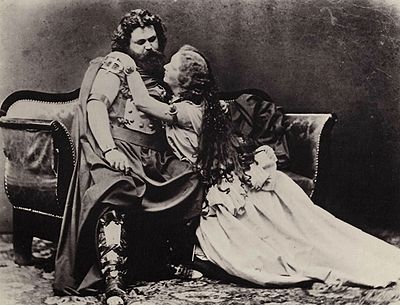
It is fortunate for us mere mortals that the sexual escapades that consume and torment the greatest artistic geniuses often produce such an enjoyable legacy of great works, and so it is the case with Richard Wagner; a lusty chap whose angst-furrowed brow concealed a pair of eyes constantly on the search for female examples of the German aesthetic. Whilst married to his wife Minna, Wagner fell for Mathilde, the young bride of a silk merchant friend. At about the same time, he also became heavily enamoured with the philosophy of Schopenhauer. Casting aside his drudgy work on the Ring Cycle, from 1857 Wagner poured his love-sick energy into creating the masterpiece that is Tristan und Isolde. The work, centering on a tale of doomed passion, was his way of artistically consumating his all-engulfing infatuation with Mathilde. Seeking to embody Schopenhauer’s aesthetic by using music to represent the will – (According to Daniel Albright, “Schopenhauer thought that music was the only art that did not merely copy ideas, but actually embodied the will itself.”) – Wagner cast the forbidden bond between himself and Mathilde as being one of pre-destined downfall; writing of his preoccupations with Schopenhauer and Tristan in a letter to his friend Franz Liszt:
Never in my life having enjoyed the true happiness of love I shall erect a memorial to this loveliest of all dreams in which, from the first to the last, love shall, for once, find utter repletion. I have devised in my mind a Tristan und Isolde, the simplest, yet most full-blooded musical conception imaginable, and with the ‘black flag’ that waves at the end I shall cover myself over – to die.
Two years later, the long-suffering Minna intercepted a love letter, and the laison was terminated. The opera was not to be completed or performed for another 7 years. During this time Wagner moved to Munich, and it was here that Ludwig II gave him the backing to stage Tristan for the first time.
The story is partly set on a ship bound for Cornwall. The aria, containing the new innovation of harmonic suspension, has a building swelling climax that urges you towards the carthartic ending. Love as transfiguration. Liebestodt means ‘the love-death’, a literal swansong.
This performance of the aria, by the impossibly german-sounding Waltraud Meier is probably my favourite so far, her voice is wonderfully sweet and warm, and she manages to convey the essence of the emotion in the words, making you believe that in the final outpouring of the energy of her soul, the power of Isolde’s love can transcend the bonds of this mortal earth. An approximate translation of the last words reads:
Shall I breathe,
Shall I listen?
Shall I drink,
immerse?
Sweetly in fragrances
melt away?
In the billowing torrent,
in the resonating sound,
in the vast wave of the world’s-breath
drown,
be engulfed
unconscious
supreme bliss!











This is great, Worm. I am almost tempted to believe that Wagner will thrill me next time I listen. I will certainly give it another try, thanks to your persuasive writing – like milk, though, Wagner’s music is something I do so want to like, but somehow, as yet, cannot. Still, if, as you suggest, it has building swelling qualities, I should definitely reassess it before Christmas, when the house will be bulging with relatives and any swelling of the interior spaces will be much appreciated.
I’m with you on the milk! blugh!
Just try this one particular piece Zmkc, and you’ll be hooked! If you watch the video it really kicks in at about 3 minutes in. The chord changes are some of the best you’ll ever hear
Yes I need persuading on Wagner too (Stephen Fry has thus far failed to convert me) and you may have done it, W.
Yes Brit, Fry would almost send you in the other direction (“I’m going through the door that HE would have used”). Bleeding chunks are fine, but may not do the trick. any more than the delectable Waltraud above. No, what you need is a damn good four hour thrashing with birch twigs, and I would suggest you begin with the Arthurian Parsifal, his last ‘music drama’. Heard it at ROH about 20 years ago; don’t remember getting home.